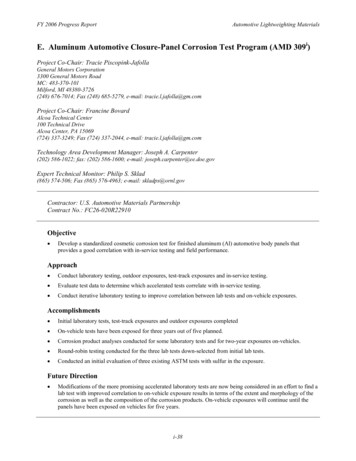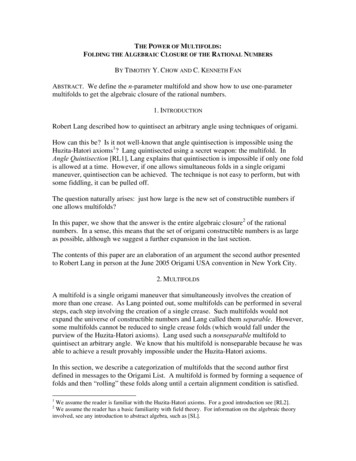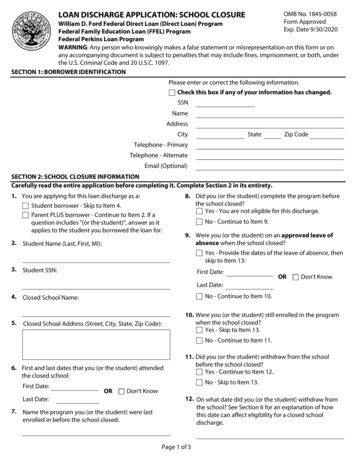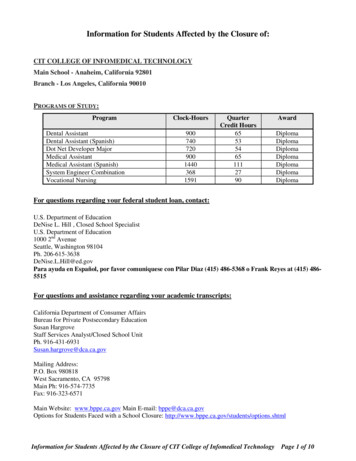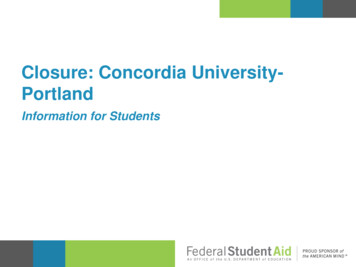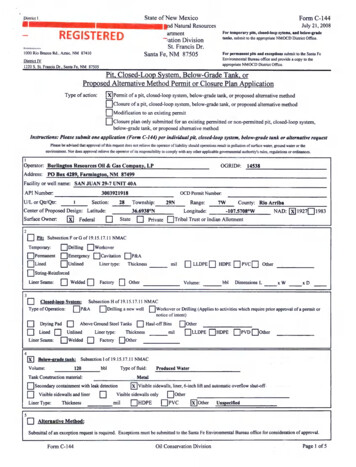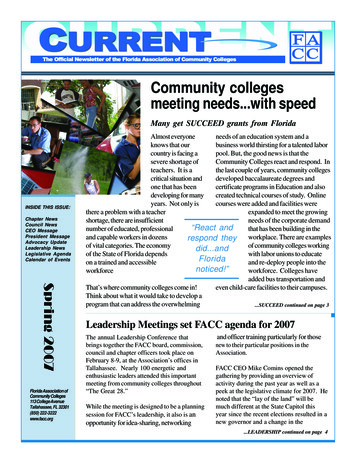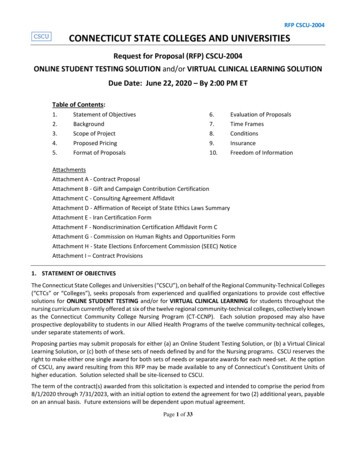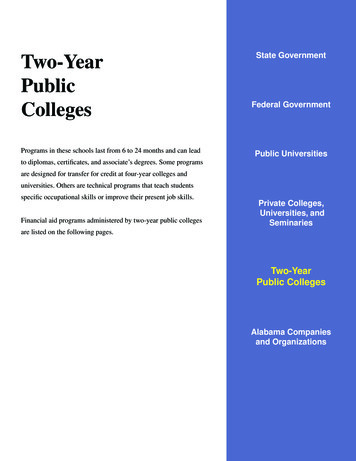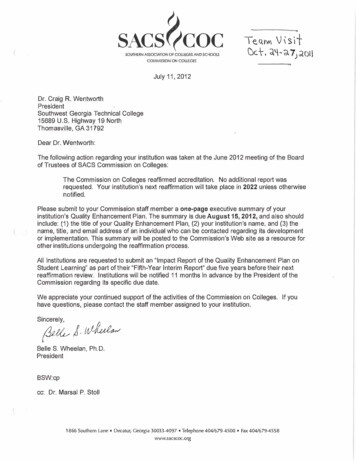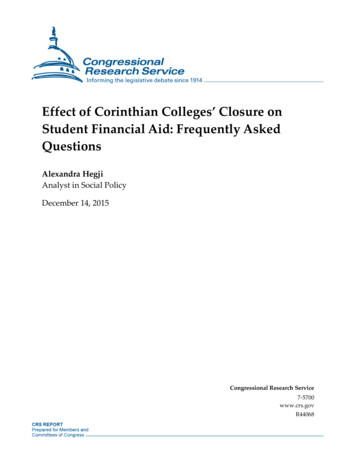
Transcription
Effect of Corinthian Colleges’ Closure onStudent Financial Aid: Frequently AskedQuestionsAlexandra HegjiAnalyst in Social PolicyDecember 14, 2015Congressional Research Service7-5700www.crs.govR44068
Effect of Corinthian Colleges’ Closure on Student Financial AidSummaryCorinthian Colleges, Inc. (CCI) was the parent company of several private, for-profit institutionsof higher education, including the Everest Institute, Everest Colleges, Heald Colleges, andWyotech Technical Schools. CCI operated more than 100 of these institutions across the nation,with total enrollments of approximately 72,000 students who annually received roughly 1.4billion in federal financial aid.In summer 2014, the Department of Education (ED) limited CCI’s access to federal student aid inresponse to CCI’s failure to address concerns relating to a variety of practices, including failing toprovide ED with requested data related to CCI’s Title IV federal student aid participation. Toavoid abrupt closure of its schools due to the financial stresses that the limited access to federalstudent aid put on CCI, the company and ED reached an agreement under which CCI agreed tosell or “teach-out” its educational programs. Subsequently, the Zenith Education Group (Zenith)was formed by the Education Credit Management Corporation (ECMC) as a nonprofit entity forthe purpose of buying a large portion of CCI’s schools. Those CCI schools not purchased byZenith closed.This report answers several frequently asked questions regarding the effect of the sale and closureof CCI’s schools as they relate to former CCI students’ student aid, including the following: Are former CCI students eligible to have their student loans discharged?How many former CCI students are eligible for or have received federal studentloan discharge as a result of CCI’s actions?How will the discharge of federal student loans affect former CCI students’ futureeligibility for loans?Will the discharge of student loans create an income tax liability for former CCIstudents?Is there any relief for former CCI students who received Pell Grants?Is there any relief for former CCI students who received GI Bill benefits?Additional information on the HEA federal student loan programs is available in CRS ReportR40122, Federal Student Loans Made Under the Federal Family Education Loan Program andthe William D. Ford Federal Direct Loan Program: Terms and Conditions for Borrowers, byDavid P. Smole; and CRS Report RL31618, Campus-Based Student Financial Aid ProgramsUnder the Higher Education Act, by Alexandra Hegji and David P. Smole.Additional information on the Pell Grant program is available in CRS Report R42446, FederalPell Grant Program of the Higher Education Act: How the Program Works and RecentLegislative Changes, by Cassandria Dortch.Additional information veterans’ education benefits is available in CRS Report R42755, ThePost-9/11 Veterans Educational Assistance Act of 2008 (Post-9/11 GI Bill): Primer and Issues, byCassandria Dortch; and CRS Report R42785, GI Bills Enacted Prior to 2008 and RelatedVeterans’ Educational Assistance Programs: A Primer, by Cassandria Dortch.Additional information on institutional eligibility to participate in the Higher Education Act TitleIV federal student aid programs is available in CRS Report R43159, Institutional Eligibility forParticipation in Title IV Student Financial Aid Programs, by Alexandra Hegji.Congressional Research Service
Effect of Corinthian Colleges’ Closure on Student Financial AidContentsIntroduction . 1Student Loans . 2Are former CCI students eligible to have their student loans discharged? . 2Private Education Loans . 2Federal Student Loans. 3How many former CCI students are eligible for or have received federal student loandischarge as a result of CCI’s actions? . 6Closed School Discharge . 6Defense Against Repayment . 6How will the discharge of federal student loans affect former CCI students’ futureeligibility for loans? . 7Will the discharge of student loans create an income tax liability for former CCIstudents? . 7Other Types of Federal Education Benefits . 8Is there any relief for former CCI students who received Pell Grants?. 8Is there any relief for former CCI students who receive GI Bill benefits?. 9ContactsAuthor Contact Information . 9Congressional Research Service
Effect of Corinthian Colleges’ Closure on Student Financial AidIntroductionCorinthian Colleges, Inc. (CCI) was the parent company of several private, for-profit institutionsof higher education, including the Everest Institute, Everest Colleges, Heald Colleges, andWyotech Technical Schools (Wyotech). CCI operated more than 100 of these institutions acrossthe nation, with total enrollments of approximately 72,000 students who annually receivedroughly 1.4 billion in federal financial aid.1On June 19, 2014, the U.S. Department of Education (ED) announced that it had placed CCI onan increased level of financial oversight known as Heightened Cash Monitoring 1 (HCM1),coupled with a 21-day waiting period for funds reimbursement, as a stipulation to its continuedparticipation in the Higher Education Act (HEA) Title IV federal student aid programs. 2 ED hadtaken this action in response to CCI’s failure to address concerns relating to a variety of practices,including failing to provide ED with requested data related to inconsistences in job placementrates that had been presented to students.3In response to its limited access to federal student aid funds, CCI announced it might have toclose its schools. On July 3, 2014, to avoid abrupt closure, CCI and ED reached an agreementunder which the company agreed to develop a plan to sell or teach-out4 its educational programs.In exchange, ED agreed to immediately release 16 million in federal student aid (FSA) funds toCCI’s current students.5Subsequently, the Zenith Education Group (Zenith) was formed as a nonprofit provider of careereducation programs. Zenith is a subsidiary of the Educational Credit Management Corporation(ECMC), a nonprofit student loan guaranty agency involved in the administration of loans madethrough the Federal Family Education Loan (FFEL) program. Zenith was formed for the purposeof buying a large portion of CCI’s schools. In February 2015, Zenith agreed to buy 53 of CCI’sschools. As part of the terms of the final agreement with ED and the Consumer Financial1U.S. Department of Education, “U.S. Department of Education Heightens Oversight of Corinthian Colleges,” pressrelease, June 19, 2014, .2ED has in place cash management regulations, which institutions participating in HEA Title IV programs (e.g., PellGrant, Subsidized and Unsubsidized Direct Loans) are required to follow when requesting and managing federalstudent aid (FSA) program funds. Typically, schools operate under the “advance payment method” of requesting FSAfunds. In this case, an institution requests FSA funds from ED. If ED accepts the request, it permits the requestingschool to draw down federal funds from its FSA processing system. However, in certain cases, ED may require aninstitution to use a different form of cash management, such as HCM1 in the case of CCI. Under HCM1, schools mustfirst disburse financial aid to eligible students from institutional funds and may then request to draw down federal fundsfrom ED’s processing system. In CCI’s case, after it disbursed financial aid funds to students it was required to wait 21days before it could request and draw down federal funds from the processing system. See 34 C.F.R. 668.162.3U.S. Department of Education, “U.S. Department of Education Heightens Oversight of Corinthian Colleges,” pressrelease, June 19, 2014, .4A teach-out plan is a “written plan that provides for the equitable treatment of students if an institution of highereducation ceases to operate before all students have completed their program of study.” HEA §487(f)(2). Teach-outplans help enable students to complete their program of study either at the closing institution or a second institution thatagrees to provide an educational program to the former institution’s students. For additional information on teach-outplans, see CRS Report R43159, Institutional Eligibility for Participation in Title IV Student Financial Aid Programs,by Alexandra Hegji.5U.S. Department of Education “U.S. Department of Education Accepts Operating Plan from Corinthian Colleges,Inc.,” press release, July 3, 2014, ges-inc.Congressional Research Service1
Effect of Corinthian Colleges’ Closure on Student Financial AidProtection Bureau (CFPB),6 Zenith agreed to provide 480 million in debt relief to former CCIstudents for private student loans advanced by CCI to its students (known as Genesis loans).7On April 14, 2015, ED notified CCI that it would fine the company 30 million formisrepresenting its job placement data at its Heald College locations. Approximately one weeklater, CCI closed its remaining 30 schools, at which approximately 13,500 students were enrolledat the time.8 In early May 2015 CCI filed for Chapter 11 bankruptcy under the U.S. BankruptcyCode.9 Finally, on November 16, 2015, ED announced additional findings against CCI formisrepresenting placement rates to former CCI students and prospective students at its EverestColleges and Wyotech campuses in California and its Everest University online program based inFlorida.10Student LoansAre former CCI students eligible to have their student loansdischarged?Former CCI students may be provided some relief from being required to repay their studentloans, depending on the type of loan they seek to have discharged and specific borrowercircumstances.Private Education LoansUnder the terms of its agreement with ED and the CFPB concerning Zenith’s purchase of certainCCI schools, Zenith agreed to provide approximately 480 million in debt relief for former CCIstudents who took out private education loans, known as Genesis loans, which were advanced byCCI to its students. The debt relief will benefit former CCI students with qualifying loans,regardless of whether the CCI schools they attended were purchased by Zenith. These borrowers’total loan balances will immediately be reduced by 40%, but borrowers will remain responsiblefor repaying the remaining balance of the loan. Borrowers who are eligible for this type of debt6The CFPB had been pursuing a separate cause of action against CCI, alleging predatory lending and illegal collectionstactics. A federal court recently entered a default judgment against CCI, ordered that CCI was liable for more than 530million, and prohibited the company from engaging in future misconduct. Consumer Financial Protection Bureau,“CFPB Wins Default Judgment Against Corinthian Colleges for Engaging in a Predatory Lending Scheme,” October28. 2015, gaging-in-a-predatory-lending-scheme/.7U.S. Department of Education, “More Than 50 Corinthian Campuses Transition to Nonprofit Status Under ZenithEducation Group,” press release, February 3, 2015, enith-education-group.8Joseph A. Smith, First Report of the Special Master for Borrower Defense to the Under Secretary, U.S. Departmentof Education, September 3, 2015, p. 5.9U.S. Department of Education, Federal Student Aid, “History of Corinthian Colleges’ Agreement with the U.S.Department of Education,” orinthian#history, accessed June 3,2015.10U.S. Department of Education, “Department of Education and Attorney General Kamala Harris Announce Findingsfrom Investigation of Wyotech and Everest Programs,” press release, November 17, 2015, ams.Congressional Research Service2
Effect of Corinthian Colleges’ Closure on Student Financial Aidrelief do not need to take additional steps to receive it. Their loan servicer will notify them if theyqualify for the relief.11Federal Student LoansFor HEA Title IV federal student loans (i.e., loans made under the Direct Loan (DL), FederalFamily Education Loan (FFEL), and Perkins Loan programs) different procedures for borrowersto receive debt relief may apply depending on whether a borrower’s loan would be discharged onthe basis of a school closure or on the basis of the borrowers asserting a defense againstrepayment.Closed School Loan DischargeStudents who attended a CCI school that closed may be eligible to have the full balance of theiroutstanding HEA Title IV loans discharged. In general, borrowers of Title IV loans may beeligible to have the full balance of their outstanding HEA Title IV loans discharged if they, or thestudent on whose behalf a parent borrowed in the case of Parent PLUS Loans, are unable tocomplete the program in which they enrolled due to the closure of the school.12 Borrowers whohave their loans discharged due to a school closure are also eligible to be reimbursed for anyamounts previously paid on those loans, and if any adverse credit history was associated with theloan (e.g., default), the loan discharge will be reported to credit bureaus so that they may deletethe adverse credit history associated with the loan.13Typically, to be eligible for loan discharge due to school closure, the student must have stoppedattending the school within 120 days of the school’s closing date and the student must also havebeen unable to complete the program of study at either the closed school or a comparableeducational program at another school, either through a teach-out or by transferring credits toanother school.14 If the closing school offers the option for students to complete their educationthrough a teach-out at another school, a student may refuse the option and would still qualify forloan discharge. If a student refuses the teach-out, later enrolls at another school in a programsubstantially similar to the one in which he or she had been enrolled, receives credit for workcompleted at the closed school, and completes the new program, then the student may not qualifyfor closed school discharge.1511For additional information on the terms of the agreement as they pertain to private education loans, see ConsumerFinancial Protection Bureau, “Special Bulletin for Current and Former Students Enrolled at Corinthian-OwnedSchools,” February 3, 2015, http://files.consumerfinance.gov/f/201502 cfpb bulletin owned-schools.pdf.12HEA §437(c)(1); HEA §455(a)(1); HEA §464(g).1334 C.F.R. §685.214(a)(4).14Guidance provided by ED to former CCI students indicates that if a student enrolled in a comparable educationalprogram at a new school, completed it, and received credits for the classes taken at the closed school, then the student isineligible for loan discharge; but, if the student enrolled in and completed a comparable program of study at a newschool and the new school did not give them credit for any coursework completed at the closed school, then the studentwould be eligible for loan discharge. U.S. Department of Education, Federal Student Aid, “Frequently Asked QuestionsAbout Corinthian Colleges,” Question 9, orinthian/faq#loandischarge, accessed December 9, 2015. Alternatively, if a student transferred credits to a new school but completed acompletely different program of study at the new school, then the student is eligible for loan discharge, as the programat the new school is entirely different than the one for which the loans were intended at the previous school. U.S.Department of Education, Federal Student Aid, “Q&A on Closed School Discharge,” ss-cancellation/closed-school#q-and-a, accessed December 9, 2015.15U.S. Department of Education, Federal Student Aid, “Frequently Asked Questions About Corinthian Colleges,”(continued.)Congressional Research Service3
Effect of Corinthian Colleges’ Closure on Student Financial AidOn June 8, 2015, ED announced that borrowers who were attending the CCI schools that closedin April 2015, and those students who withdrew within 120 days of those schools closing, wouldbe immediately eligible for closed school discharge of their Title IV student loans, so long as theyneither finish their program of study through a teach-out16 nor transfer the credits they earned at aCCI school to another school in a similar program. Additionally, ED expanded the withdrawaltimeframe for students who attended those CCI schools that closed in April 2015. ED will nowpermit those students who withdrew from those schools after June 20, 2014, to have their Title IVstudent loans discharged due to school closure.17 As a result of the expanded timeframe, EDestimates approximately 15,000 students in total are eligible to have their Title IV student loansdischarged under this procedure, approximately 1,500 more students than would have beeneligible without the expansion.18Borrowers who are eligible for this type of relief must fill out the Closed School Loan DischargeApplication and return it to their loan servicer.19 While their applications are being considered,borrowers are required to continue making payments on their loans, although loan servicers arepermitted to grant forbearance20 until a decision is made. Additionally, to obtain discharge aborrower must cooperate with ED in any judicial or administrative proceeding brought by ED torecover amounts discharged from the school.21 If a borrower fails to cooperate with ED, the loandischarge may be revoked.22Borrower Defense Against RepaymentBorrowers who attended a CCI school that was purchased by Zenith and borrowers who attendeda CCI school that closed but who are ineligible for closed school loan discharge may seek debtrelief on their FFEL or DL program loans by asserting certain defenses against repayment.23 Incertain circumstances, borrowers of DL program loans may be able to assert as a defense againstrepayment of their loan “acts or omissions of an institution of higher education,” as specified in(.continued)Question 10, orinthian/faq, accessed December 9, 2015.16Zenith has indicated its int
misrepresenting its job placement data at its Heald College locations. Approximately one week later, CCI closed its remaining 30 schools, at which approximately 13,500 students were enrolled at the time.8 In early May 2015 CCI

